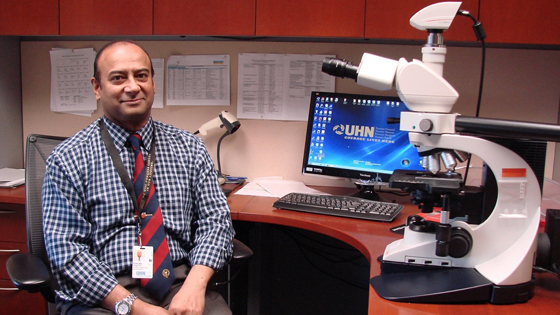
Interim Medical Director, LMP, Dr. Runjan Chetty with a microscope used to view tissue samples at a cellular level, and provide accurate diagnoses for UHN patients. (Photo: Laboratory Medicine Program)
The Laboratory Medicine Program (LMP) has an impact on nearly every patient that comes through UHN hospitals and provides physicians with the necessary information to effectively treat patients.
The program specializes in research, education, and clinical services helping shape the future of laboratory science at UHN.
As the newly appointed Interim Medical Director, LMP, Dr. Runjan Chetty shares how he plans to advance the great work already being done by the program.
Tell us about your new role.
As Interim Medical Director for the Laboratory Medicine Program I will act as a representative for our staff and our work, and will be responsible for coordinating our four internal departments: Clinical Biochemistry, Clinical Microbiology, Hematology, and Pathology. I will act as somewhat of a conduit for the program, connecting our departments and facilitating our joint efforts.
Additionally, I am also Pathologist-in-Chief and Director of External Partnerships for LMP. Within these roles I will provide consultation to various other laboratories in Canada, and will continue to advise our partners in Qatar and Kuwait.
What was your role in UHN before you became Interim Medical Director?
I was previously the Deputy Medical Director, LMP, and I was – and will continue to work as a pathologist for the program specializing in Gastrointestinal Pathology. Also much earlier in my career I worked at UHN as the Director of Surgical Pathology.
Why did you choose to accept this leadership position?
It's an incredible honour and a privilege to lead this tremendous program. We have some of the most talented laboratory staff in the world, the largest medical laboratory in Canada, and we're regularly making significant findings in our research that translate to improved patient care. To represent such a strong program and strong organization is absolutely incredible.
I'm passionate about the work we do here, and I'm passionate about continuing the work of Dr. Sylvia Asa. I'm also excited to bring my own leadership style and build on what we currently have. I want to apply a personal touch to the things we do, and I'm genuinely proud to have this opportunity.
You also did some work at the University of Oxford. Tell us about that.
At Oxford, I was Head of the Clinical Pathology department, and Director of Translational Pathology. It was a very rigorous process to be appointed, and I think it shaped me in respect to larger roles in my professional career. There were three key aspects working at Oxford: the educational side of the university, the clinical side of the hospital, and the research side of translational pathology. Although I divided my time among the various roles, there was always a joint focus on bringing practices from bench to beside, which I still thrive on.
Why did you choose pathology?
Honestly, I didn't set out to. I wanted to be more hands on, more physical – have an interactive role. I really wanted to be a surgeon. But, when I did my surgical internship, I realized that trauma just wasn't for me, and I began to gravitate towards pathology.
It was exactly what I was looking for; it's making decisions, diagnoses, and having an impact on patients in a very direct way. It's truly the bedrock of all medical specialties, and the diagnoses we make are fundamental to patient outcome.
In LMP, we speak about our commitment to advancing research, education and clinical service – what are some of your ideas around investing in those areas?
We truly have a great foundation, and we're going to build upon that to make a larger, more substantial impact in the work we do.
Currently, we are further developing our research committee to introduce a series of guidelines to promote funding and development. We also have a new Director of Education to expose our program to a wider audience and provide more opportunities for students, educators, and partners.
As always our number one priority is patients, and therefore our clinical service is always evolving. It needs to be responsive, contemporary, and offer high quality expertise. It's why we're here – it's what drives us.
How do you see our role in local and international partnerships evolving?
I believe individualization plays a critical role in true partnerships. Each partnership is different and therefore each partnership should be treated uniquely. A cookie cutter approach doesn't foster real development and we need to ensure our collaborations serve all parties mutually.
As a global player with world-class expertise, we have a philanthropic duty to offer our time and assistance. We want to share, we want to help others advance, and we want to tailor each individual partnership, as knowledge-sharing benefits all.
What are you most impressed with in LMP?
Our size and talent is sometimes taken for granted, but there are truly few places in the world that offer our level of staff expertise and laboratory infrastructure. As an integral part of UHN we have a global reputation that is widely respected, and it's our tremendous team that allows us to succeed.
It takes each and every one of us to fulfill the LMP vision of being global leaders in laboratory medicine and we must continually seek improvements by asking ourselves: What can I do; what can I learn; how can I be better?
